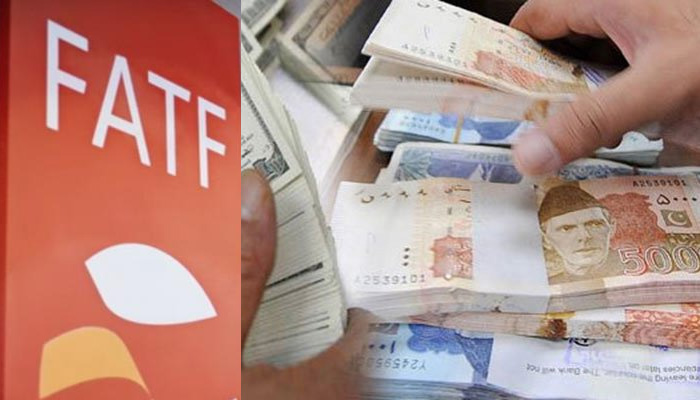Pakistan vows to address deficiencies in AML compliance
KARACHI: Pakistan has vowed to address the strategic deficiencies identified by the global financial system watchdog in the country’s compliance with the standards of anti-money laundering (AML) and combating the financing of terrorism (CFT).
The Financial Action Task Force (FATF) on Friday said Pakistan provided “a written high-level political commitment to address the identified deficiencies”.
“The FATF calls on [Pakistan] to complete the implementation of action plan expeditiously and within the proposed timeframe,” said the taskforce that works to identify the risks to the international financial system.
A Pakistani delegation attended the FATF six-day plenary meeting, which concluded on Friday, to submit its action plan to curb money laundering and terror financing. In February, the FATF decided to place the country on its grey list, but Pakistan managed to avert being placed on the black list.
The country was previously part of high risk jurisdictions (blacklist) in 2008 and 2012, while it was under jurisdictions that were making sufficient progress (grey list) in 2010 and 2014. Pakistan was removed from the grey list in 2015.
The FATF said it will closely monitor the implementation of the action plan put forward by Pakistan.
Pakistan made a high-level political commitment to work with the FATF and its subgroup Asia Pacific Group to strengthen its AML/CFT regime and to address its strategic counter-terrorist financing-related deficiencies.
The country will demonstrate “that terror financing risks are properly identified, assessed and that supervision is applied on a risk-sensitive basis”.
The country is cooperating and taking action to identify and take enforcement action against illegal money or value transfer services. It is identifying cash couriers and enforcing controls on illicit movement of currency and understanding the risk of cash couriers being used for terror financing.
Pakistan vowed to effectively implement “targeted financial sanctions (supported by a comprehensive legal obligation) against all 1267 and 1373 designated terrorists and those acting for or on their behalf, including preventing the raising and moving of funds, identifying and freezing assets (movable and immovable), and prohibiting access to funds and financial services”.
The country will strengthen enforcement against violations of terror financing services, including administrative and criminal penalties and provincial and federal authorities cooperating on enforcement cases.
“The FATF continues to identify additional jurisdictions, on an ongoing basis, that pose a risk to the international financial system,” FATF said.
“The FATF and the FATF-style regional bodies (FSRBs) will continue to work with the jurisdictions… and to report on the progress made in addressing the identified deficiencies.”
Currently, FATF has officially designated 10 countries under high-risk jurisdictions (blacklist) and jurisdictions that are making sufficient progress (grey list).
-
 YouTube Tests Limiting ‘All’ Notifications For Inactive Channel Subscribers
YouTube Tests Limiting ‘All’ Notifications For Inactive Channel Subscribers -
 'Isolated And Humiliated' Andrew Sparks New Fears At Palace
'Isolated And Humiliated' Andrew Sparks New Fears At Palace -
 Google Tests Refreshed Live Updates UI Ahead Of Android 17
Google Tests Refreshed Live Updates UI Ahead Of Android 17 -
 Ohio Daycare Worker 'stole $150k In Payroll Scam', Nearly Bankrupting Nursery
Ohio Daycare Worker 'stole $150k In Payroll Scam', Nearly Bankrupting Nursery -
 Michelle Yeoh Gets Honest About 'struggle' Of Asian Representation In Hollywood
Michelle Yeoh Gets Honest About 'struggle' Of Asian Representation In Hollywood -
 Slovak Fugitive Caught At Milano-Cortina Olympics To Watch Hockey
Slovak Fugitive Caught At Milano-Cortina Olympics To Watch Hockey -
 King Charles Receives Exciting News About Reunion With Archie, Lilibet
King Charles Receives Exciting News About Reunion With Archie, Lilibet -
 Nvidia Expands AI Infrastructure With Nevada Data Centre Lease
Nvidia Expands AI Infrastructure With Nevada Data Centre Lease -
 Royal Family Shares Princess Anne's Photos From Winter Olympics 2026
Royal Family Shares Princess Anne's Photos From Winter Olympics 2026 -
 Tori Spelling Feels 'completely Exhausted' Due To THIS Reason After Divorce
Tori Spelling Feels 'completely Exhausted' Due To THIS Reason After Divorce -
 SpaceX Successfully Launches Crew-12 Long-duration Mission To ISS
SpaceX Successfully Launches Crew-12 Long-duration Mission To ISS -
 PlayStation State Of Play February Showcase: Full List Of Announcements
PlayStation State Of Play February Showcase: Full List Of Announcements -
 Ed Sheeran, Coldplay Caught Up In Jeffrey Epstein Scandal
Ed Sheeran, Coldplay Caught Up In Jeffrey Epstein Scandal -
 US, China Held Anti-narcotics, Intelligence Meeting: State Media Reports
US, China Held Anti-narcotics, Intelligence Meeting: State Media Reports -
 Paul Anthony Kelly Reveals How He Nailed Voice Of JFK Jr.
Paul Anthony Kelly Reveals How He Nailed Voice Of JFK Jr. -
 Victoria, David Beckham React To Marc Anthony Defending Them Amid Brooklyn Drama
Victoria, David Beckham React To Marc Anthony Defending Them Amid Brooklyn Drama




